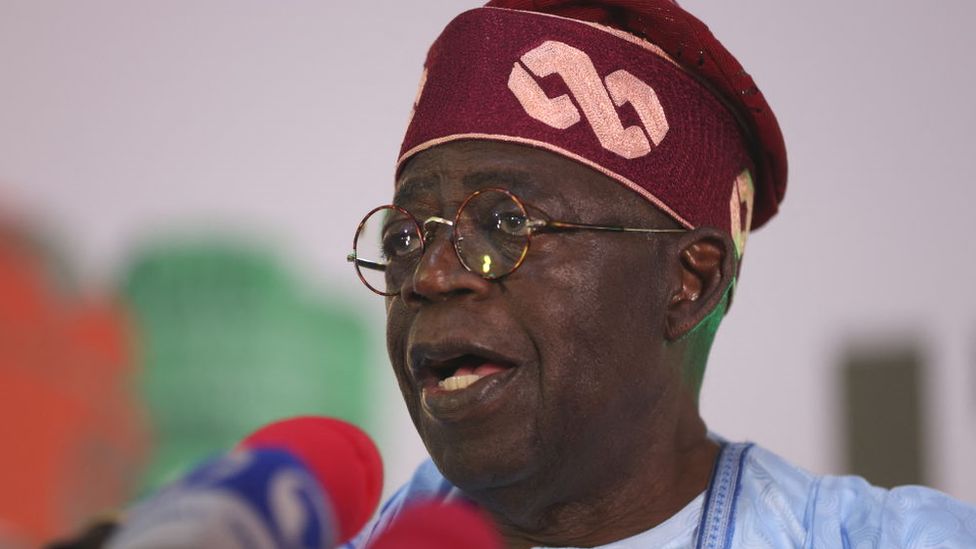
A BBC investigation has found evidence suggesting some results from Nigeria’s presidential election may have been manipulated.
The winner Bola Tinubu is due to be inaugurated on 29 May but the opposition is challenging this.
The BBC has uncovered significant anomalies in Rivers state, a key battleground, although not sufficient to change the overall national outcome of the election, which took place in February.
There are also questions over the identity of an election official who read out some of the unexplained results.
How votes are counted in Nigeria
On 25 February, Nigerians cast their votes at thousands of polling stations across the country.
At each polling station, the votes for the party of each candidate were publicly announced and the results sheets taken for collation first at the ward level, then at local government (LGA) centres.
An election official from each LGA then travelled to the state capital, where these results were officially declared.
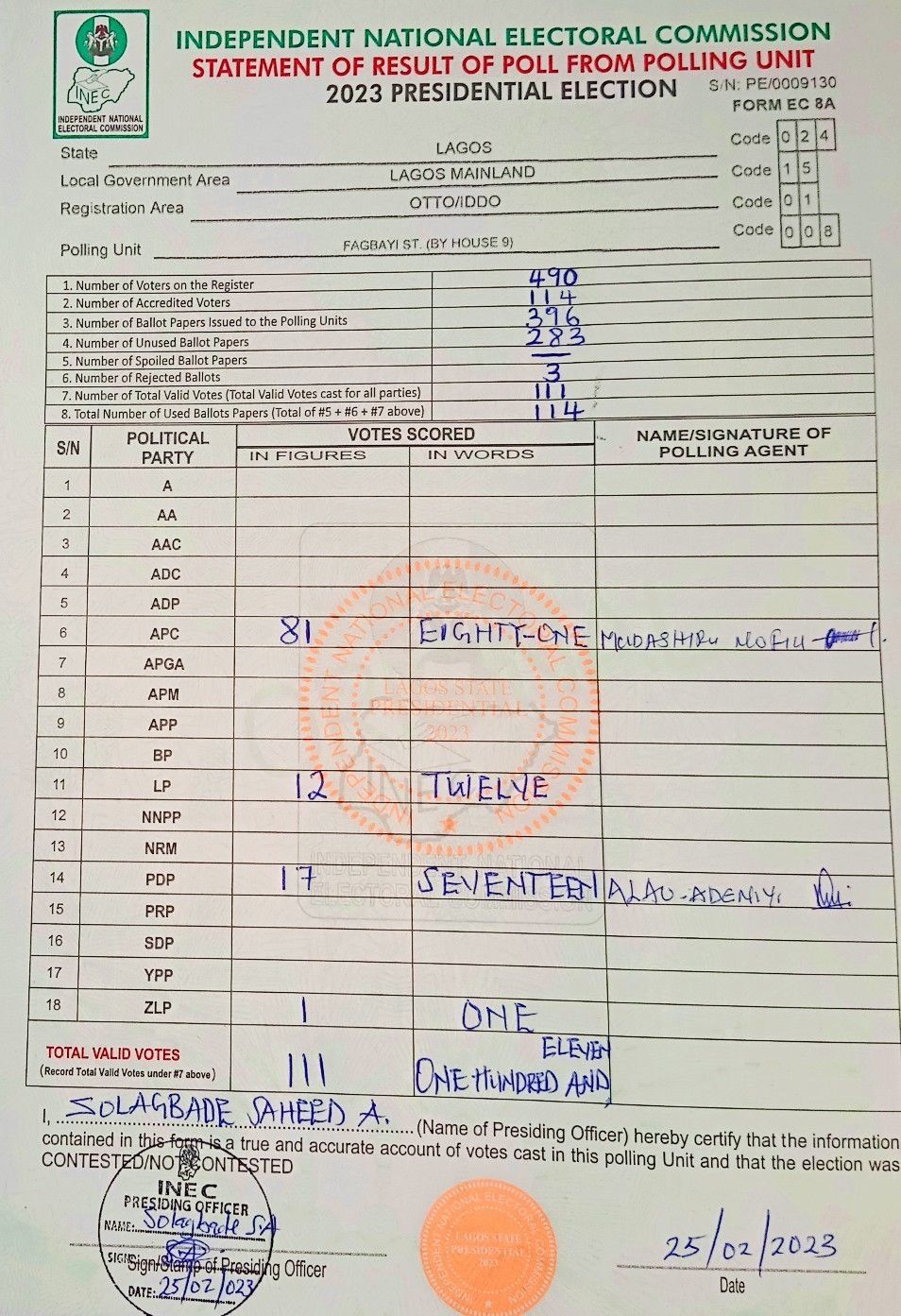
For the first time in a Nigerian election, photographs of the polling station results sheets were published online by the electoral commission.
This made it possible to add up all the polling station sheets and to compare them with the results declared at the state level.
What we found in Rivers state
We added up the voting tally sheets from over 6,000 polling stations in Rivers state, where many of the opposition complaints had been made.
While the official result in this state gave a clear majority to Bola Tinubu of the ruling All Progressives Congress (APC), our tally suggested that Peter Obi of the Labour Party (LP) had actually received most votes in the state by a wide margin.
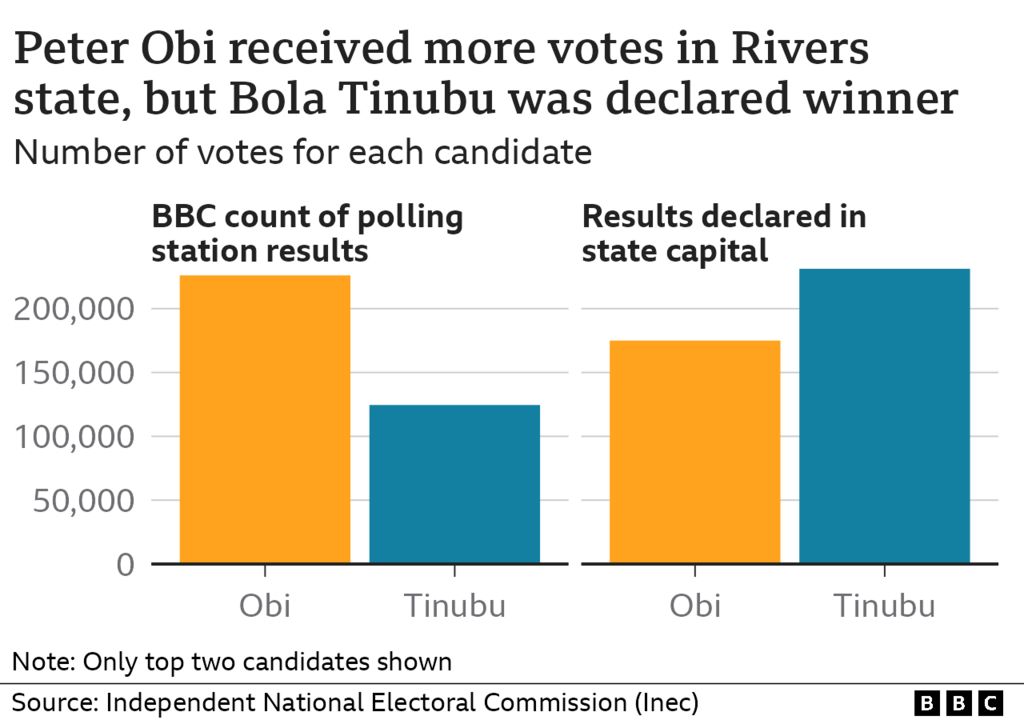
We found an increase of just over 106,000 in Mr Tinubu’s vote in the official declaration when compared with our polling station tally – almost doubling his total in the state.
In contrast, Mr Obi’s vote had fallen by over 50,000.
It’s important to make clear that although we searched through the election website for every single one of the 6,866 polling stations in Rivers state, we were not able to obtain results from all of them.
Some were incorrectly uploaded, others were missing, even after a month from the date of polling.
For about 5% of polling stations, the photos of tally sheets were too blurred for us to read. It’s reasonable to assume that the official count would have included these as they would have had the original documents.
In another 17%, there were no results at all. Many of these would have been places where no voting took place due to security issues or the non-arrival of voting materials. Others had technical problems preventing officials uploading the documents.
So there clearly would have been more polling stations included in the final official results that weren’t included in the BBC investigation.
However, these additional tally sheets would have increased the totals for each party, not decreased them. And what we found was that the votes for Peter Obi’s Labour Party had decreased sharply in Rivers state.
So how can the sharp fall in votes for Peter Obi – in the official result – be explained?
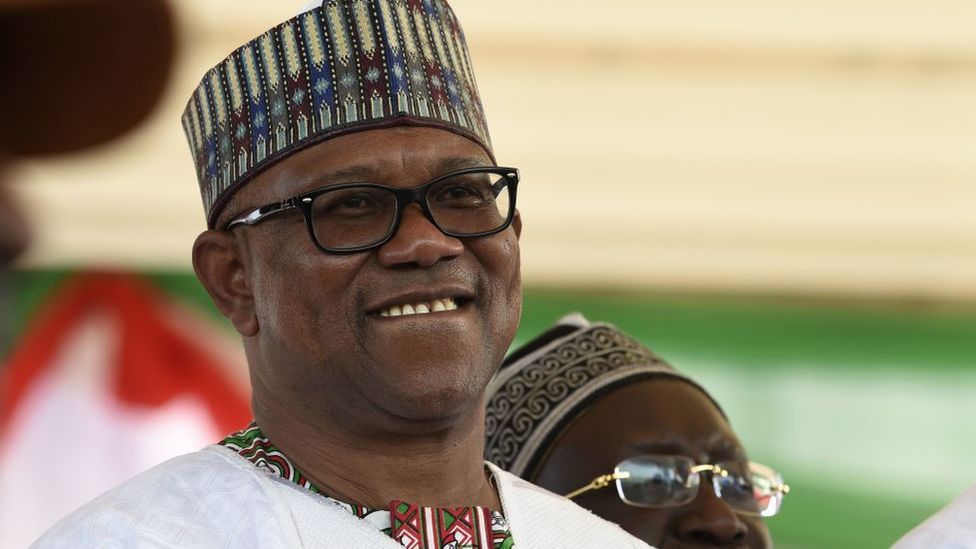
Where were the biggest discrepancies?
Two areas stood out.
The first was the Oyigbo local government area, where we found:
- The vote for Bola Tinubu was six times larger in the officially announced results compared with the BBC’s polling station count
- Peter Obi’s votes had been cut in half
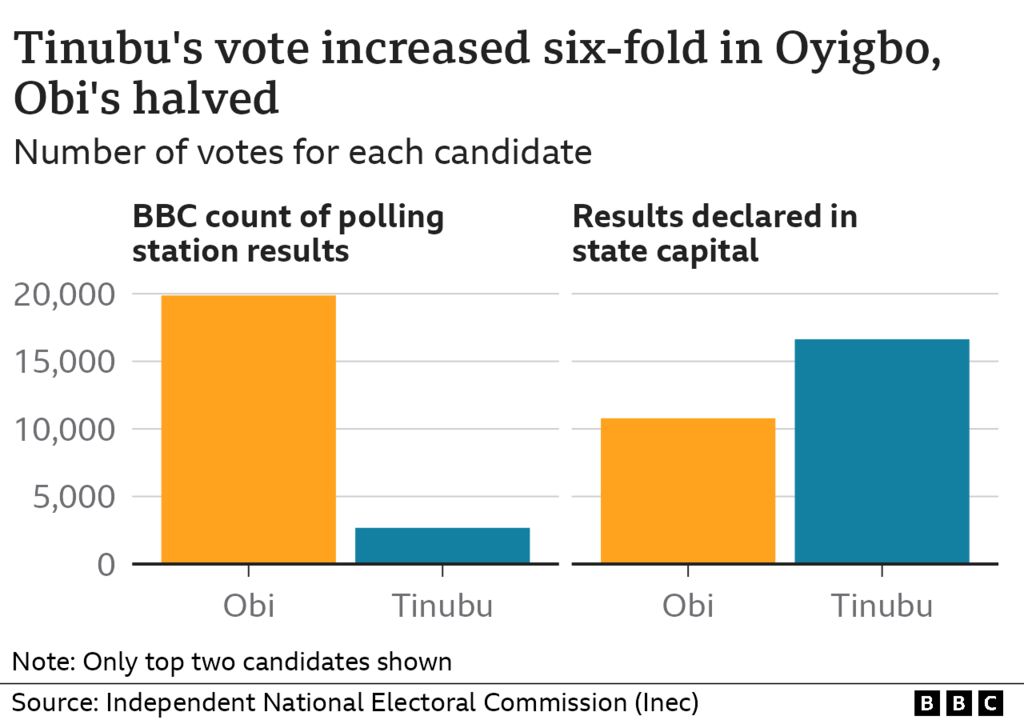
The second local government area where we found major discrepancies was in nearby Obio/Akpor:
- The official result for Mr Tinubu was 80,239 votes, but we counted just 17,293 votes from polling station tallies
- The count for Mr Obi was announced officially as just 3,829 votes, but the BBC counted 74,033 votes for him on the tally sheets
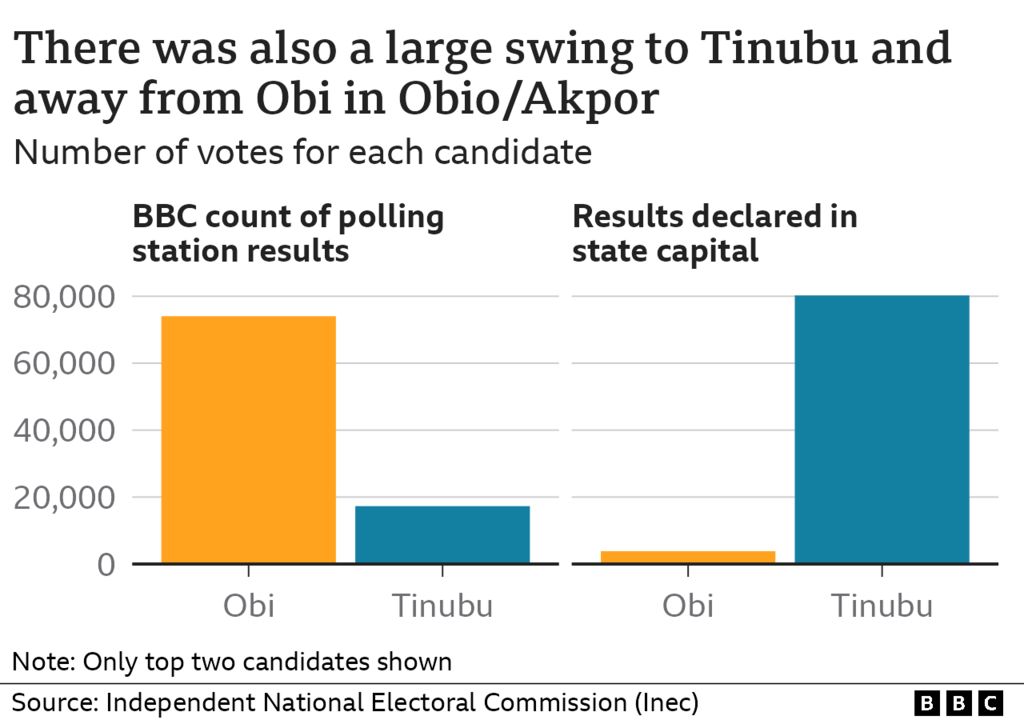
So how did these differences occur?
As explained earlier, all the polling station sheets are collated at local government (LGA) headquarters.
We found an official election document with these collated votes for the Oyigbo area, signed by an election official and some of the party agents.
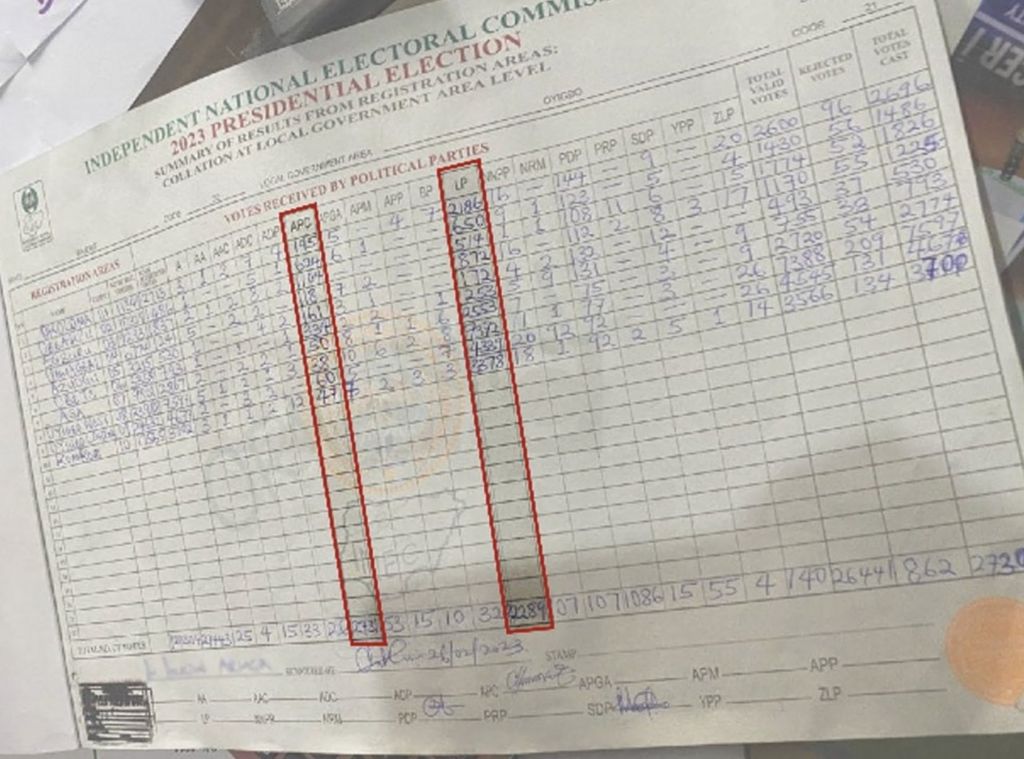
Several different photographs had been taken of it and uploaded on social media accounts.
The numbers in this document closely matched our own tallies for the two leading candidates (Obi and Tinubu).
This would have been one of the 23 collation sheets from LGAs in Rivers state taken to the state capital, Port Harcourt, for the official declaration.
Broadcast live on television on 27 February, in front of a bank of microphones, Oyigbo election official, Dr Dickson Ariaga, announced his name and that he worked for the Federal College of Education in Omoku.
On the recording, the word “Omoku” is indistinct, but there is only one Federal College of Education in Rivers state.
Dr Ariaga then read out the results for each party in alphabetical order, including for all the smaller parties.
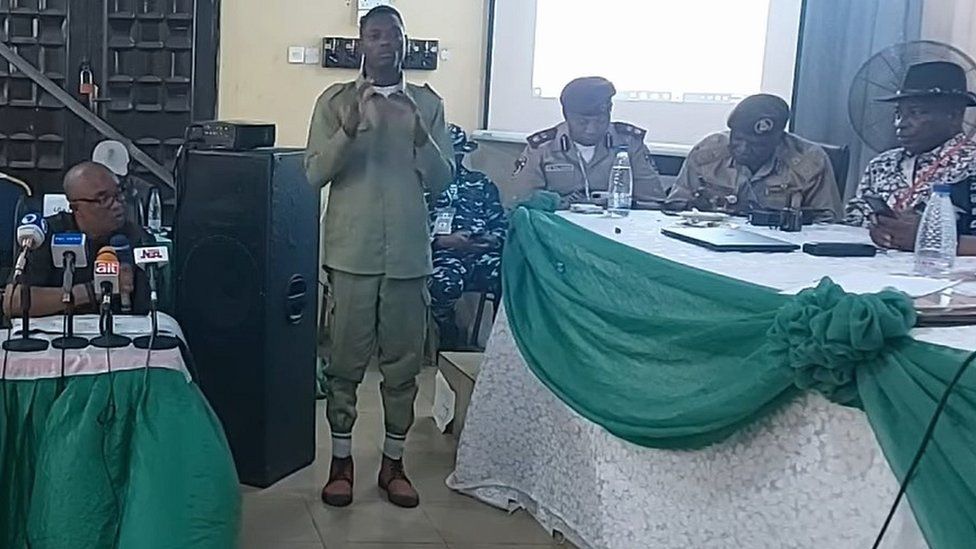
They all matched those on the collation sheet the BBC had obtained. But when he reached Mr Tinubu’s APC, instead of saying 2,731 as written on our photograph of the sheet, he read out “16,630”.
Then for Mr Obi’s party (LP) the figure changed again – instead of the 22,289 seen on the sheet, he announced “10,784”, more than halving his vote.
The mystery surrounding Dickson Ariaga
We asked the electoral commission if we could speak to Dr Ariaga, but they would not give us his details or reach out to him for us.
We spoke to the election official seated next to Dr Ariaga, but she told us she wasn’t authorised to talk to the press.
So we sent a reporter to the Federal College of Education in Omoku, about two hours drive north of Port Harcourt, where he’d said he worked when introducing himself.
The Deputy Provost Moses Ekpa told the BBC: “From our records, both from our payroll and from our human resources, there is no such a name in our system and we don’t know such a person.”
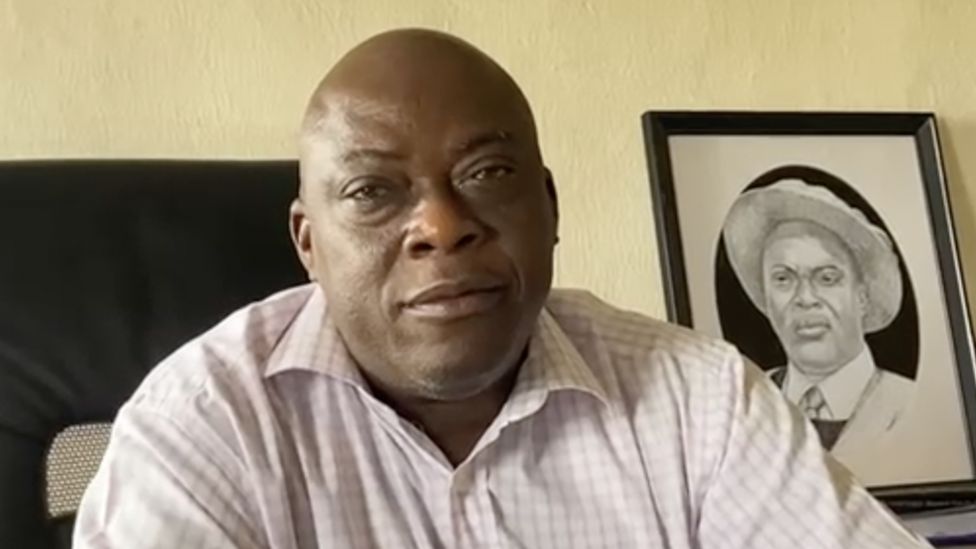
We tried tracking him down on social media and eventually came across another Facebook account for someone in Port Harcourt, whose profile details had the name Dickson Ariaga.
When we compared an image from this account to the television pictures of Dr Ariaga using Amazon Rekognition software, we achieved a match of 97.2%, indicating a very high probability they’re the same man.
Dr Ariaga did not respond to messages sent by us to this account.
By reaching out to his Facebook friends we did finally manage to speak to a man who said he was a relative, who was at first willing to help us but then didn’t return our calls.
What have the authorities said?
We put these findings to Nigeria’s Independent National Electoral Commission (Inec).
Johnson Sinikiem, Inec’s regional spokesman in Port Harcourt, told us that due to a “gross shortage of time and personnel” they had needed to take on some people without verifying their identity documents.
Referring to Dr Ariaga, he said: “If he had presented himself as a lecturer from [the college in Omoku] and it’s otherwise, then he is dishonest.”
We also approached Inec’s headquarters in Abuja for a response to our findings of discrepancies in the results in Rivers state. We were told that they were unable to comment due to ongoing legal challenges.
This is just one case in one state in southern Nigeria where the evidence points to the results having been manipulated.
On their own, these altered results would not have decisively swayed the outcome of the presidential election. Bola Tinubu won the national presidential vote by 1.8m votes over his nearest rival, Atiku Abubakar of the PDP.
We’re still looking for Dr Ariaga to respond to the findings in this report.
Additional reporting by Liana Bravo, Jemimah Herd, Jake Horton and Kumar Malhotra
Edited by Dan Isaacs

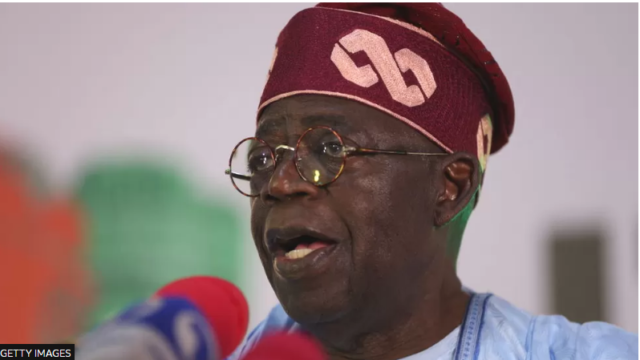






Dr. Ariaga should not be difficult to find by the authorities if they really want him. For a crime this enormous he is a key witness and must be produced by those who hired him. No one should be given such a task if the person is not dutifully vetted. Arrest the person that vetted or hired him and have him in custody for starters. Soon afterwards all involved will come up.